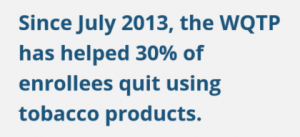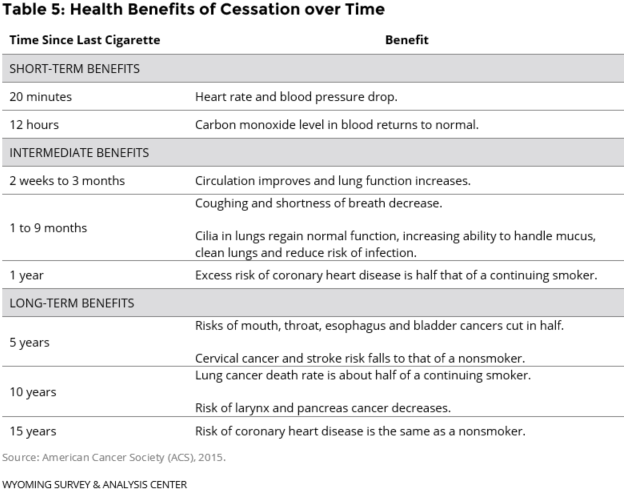Encourage Tobacco Users to Quit
Benefits of Cessation
Smoking cessation has short- and long-term health benefits (Table 5). Some health effects of smoking cessation (e.g., increased lung functioning) are evident within a few weeks or months of quitting, suggesting that relatively brief periods of abstinence have health benefits. Others (e.g., reduced risk of stroke) are not fully evident for five years or longer, reflecting the long-term benefits of successful smoking cessation (as compiled by the American Cancer Society, 2015). Smoking cessation stops the processes which lead to cancer (CDC, 2010).

Cessation Among Wyoming Smokers
In 2017, most (87%) adults in Wyoming who smoked every day or some days had stopped smoking for at least one day in their lifetime because they were trying to quit smoking for good, likely a success from public health efforts from groups such as the TPCP, CDC, and U.S. Surgeon General’s Office. This statistic has remained fairly steady since 2010. Of those smokers who had tried to quit in their lifetime, over half tried to quit smoking at least once in the past year. Nicotine replacement therapies (NRTs) are the most popular type of cessation aid in Wyoming; 31% of current smokers who had made a quit attempt within the past year used NRTs. Common barriers for people trying to quit smoking were loss of a way to handle stress, cravings for a cigarette, and other people smoking around them (WYSAC, 2018a). Evidence-based programs like the Wyoming Quit Tobacco (WQT) program include coaching to address these barriers.
The Wyoming Quit Tobacco (WQT) Program
The WQT program assists Wyoming residents who want to quit using tobacco by offering them telephone-based cessation coaching, NRTs, and prescription medications. In addition, the WQT program offers online, texting, and email support services. National Jewish Health has been the WQT program service provider since 2013.
In 2017, 49% of non-tobacco users and 77% of tobacco users said they were aware of telephone quitline services, such as the WQT program, that are available to help people quit using tobacco (WYSAC, 2018a).
Most people who enroll in the WQT program do so to get help quitting cigarettes, though some seek help quitting smokeless tobacco, ENDS/e-cigarettes, and/or other tobacco (e.g., cigars, cigarillos, little cigars, hookah, and pipes). Since July 2013, when National Jewish Health became the WQT program service provider, 30% of enrollees had not used any tobacco products for at least 30 days when they answered the Follow-Up Survey seven months after enrolling. This success rate is a key success of efforts funded by the WDH. Enrollees who use phone coaching and prescription medication such as Chantix often see the greatest success rates, including a substantial improvement over using phone coaching alone (currently, enrollees must use phone coaching to obtain medications).

